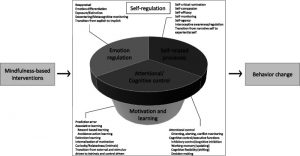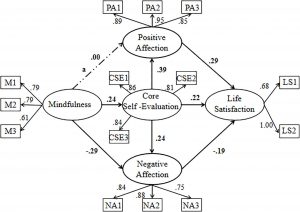
By John M. de Castro, Ph.D.
In today’s Research News article “From contemplation to serenity: how yoga meditation improves the mental health of female college students” (See summary below or view the full text of the study at: https://pmc.ncbi.nlm.nih.gov/articles/PMC11931514/ ) Liu and colleagues studied the effects of yoga meditation on the mental health of female college students. They report that yoga meditation improved the women’s mental health including significantly reduced anxiety, depression, and stress and increased emotional regulation and self-awareness.
Improve mental health with yoga meditation.
CMCS – Center for Mindfulness and Contemplative Studies
This and other Contemplative Studies posts are also available on the Contemplative Studies Blog http://contemplative-studies.org
Study Summary
Liu L, Liu C, Tang L, Wang X, Feng Q. From contemplation to serenity: how yoga meditation improves the mental health of female college students?. Front Psychol. 2025;16:1545943. Published 2025 Mar 10. doi:10.3389/fpsyg.2025.1545943
Abstract
Objective
This study aims to investigate the impact of yoga meditation on the mental health of female college students, focusing on how meditation improves emotional regulation, alleviates stress and strengthens psychological resilience.
Methods
Employing a combination of quantitative assessment and qualitative analysis, the study measured participants’ emotional states, stress levels, and psychological resilience across multiple time points to track participants’ mental health changes dynamically. In-depth interviews and analysis of meditation journals were also conducted.
Results
Yoga meditation significantly reduced anxiety, depression, and perceived stress while enhancing emotional regulation and self-awareness. Meditation positively influenced neuroplasticity, inducing beneficial changes in brain regions associated with emotional control and cognitive flexibility. Additionally, improved autonomic nervous system function was observed, with increased parasympathetic activity and reduced sympathetic response. Meditation strengthened psychological resilience in female college students, improved stress-coping strategies, and sustained positive mental health benefits even after the intervention.
Conclusion
Yoga meditation is an effective mental health intervention, bolstering emotional regulation and reducing stress among female college students. Integrating yoga meditation into campus mental health programs is recommended to provide students with greater practice opportunities and personalized guidance.








